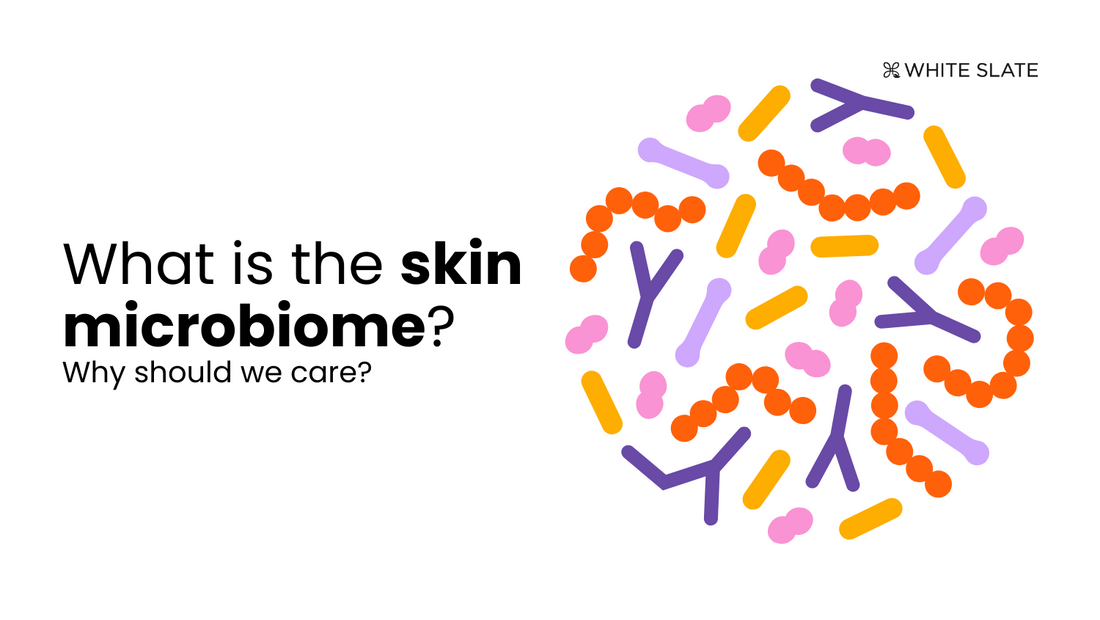When we consider skincare, we tend to consider cleansing, moisturizing, or sun protection. There is, however, an invisible layer that labors tirelessly throughout the day to maintain your skin's health—the skin microbiome. This living ecosystem of small organisms has a very significant role to play in protecting, repairing, and maintaining the integrity of the skin barrier. Understanding how to maintain it is the key to long-term skin health.
Your Skin Microbiome: Nature's Defense System
Your skin microbiome is the trillions of microscopic living organisms—bacteria, fungi, viruses, and even mites—residing on your skin. While "bacteria" might sound scary, most of these microbes are harmless or even beneficial to you. In fact, your skin microbiome is nearer to a protective barrier that shields your skin from bad germs, environmental toxins, and inflammation.
This microbiome is different based on where in the body it is—what's on your face isn't the same as what's on your arms or feet. It's different based on age, sex, climate, how clean you are, what you're eating, and even your skin products.
Why is the skin microbiome significant?
The skin microbiome is not simply something that exists there; it has a key function to protect and heal your skin. Here's why it is extremely crucial:
1. Keeps Away Bad Germs
The helpful bacteria on your skin combat dangerous pathogens by competing for nutrients and space and essentially displacing them.
2. Regulates Skin pH
The skin microbiome keeps the skin pH slightly acidic, and this does not support the growth of pathogenic bacteria.
3. Boosts Immune Response
Microbes talk to immune cells and skin cells to control inflammation. This prevents intense reactions that can lead to eczema, psoriasis, or acne.
4. Facilitates Healing
A robust microbiome helps in faster healing of wounds and maintains the skin barrier robust and resilient.
5. Averts Inflammatory Skin Diseases
Dysbiosis, or imbalance of the skin microbiome, has been linked to acne, rosacea, dermatitis, and sensitivity. Rebalancing them can create clearer, more tranquil skin.
In effect, the microbiome on your skin is your defense mechanism and a very important aspect of having healthy skin.
Why Are Prebiotics Important?
Just as plants require soil to grow, healthy skin bacteria require nutrients to survive. Prebiotics are what they need.
Prebiotics are supplements that allow good bacteria to grow on the skin. They are not living organisms like probiotics, but they nourish them.
Benefits of Prebiotics in Skincare:
- Encourage the growth of healthy skin bacteria
- Reduce pain and swelling.
- Enhance skin moisture and texture
- Assist the skin barrier function effectively.
Natural prebiotics that are often used in skincare include inulin, alpha-glucan oligosaccharide, and plant sugars. Adding these to your routine—especially natural skincare products—nourish your microbiome without employing harsh chemicals that can damage your skin.
How to Support a Healthy Skin Microbiome
If your skin care regimen is too harsh or too clean, it may be damaging your microbiome. This is how to build it up:
1. Utilize Gentle Cleansers
Steer clear of abrasive, high-pH sulfate cleansers. Cleanse your face instead with gentle, microbiome-friendly face cleansers that effectively cleanse without upsetting your skin's equilibrium.
2. Avoid Over-Exfoliating
Over-exfoliation removes beneficial microbes. Both chemical and physical exfoliants should be applied 1 to 2 times weekly.
3. Choose Natural Skin Care Products
Fewer ingredients, no added fragrances, and prebiotic-enriched formulas keep your microbiome in tip-top shape.
4. Nourish and Hydrate
Moisturizers that mimic your skin's own lipids assist in defending the skin barrier and thereby assist your microbiome.
5. Reduce Antibacterial Products
Unless told otherwise, don't use antibacterial soap or sanitizers on your body and face every day—they will kill the good bacteria as well.
Frequently Asked Questions (FAQs)
Q1: Are probiotics safe to use on the skin?
Yes, skin probiotics are becoming more popular among dermatologists. They regulate the good bacteria on the skin, especially after redness or pimples.
Q2: What are prebiotics compared to probiotics in skincare?
Prebiotics nourish the good bacteria, and probiotics consist of live beneficial bacteria. Both support a healthy balance of microbes.
Q3: How do I know whether my skin microbiome is unhealthy?
Symptoms resemble recurring breakouts, dryness, itchiness, redness, or heightened sensitivity.
Q4: Are natural skincare products good for the microbiome?
Yes. Non-stripping, natural products won't disturb your skin's ecosystem quite so easily and are quite often microbiome-friendly.
Q5: Is it possible to fix my damaged skin microbiome?
Yes. With proper care—gentle washing, moisturizing, and microbiome-friendly ingredients—your skin will heal.
Disclaimer
This is for educational purposes only and not a substitute for medical treatment. If you think you have an issue with your skin microbiome or ongoing skin problems, visit a dermatologist. Natural skin products can assist the microbiome, but everyone's reactions will be unique.

